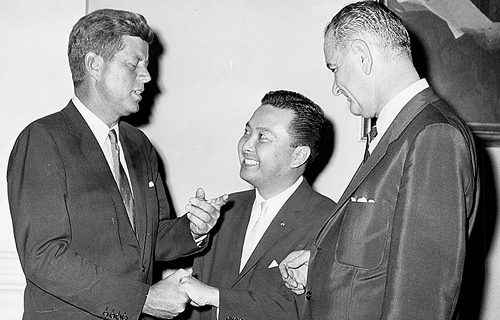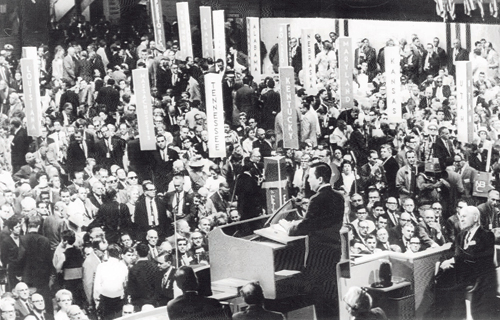National stage

Inouye meets with President John F. Kennedy and Vice President Lyndon Johnson. After Johnson became president, he urged Hubert Humphrey to consider Inouye for his vice presidential running mate in the 1968 election.

Inouye's keynote address at the Democratic National Convention in Chicago was broadcast live in Hawaii.

"This is my country," the young lawmaker said in his keynote address at the convention. "Many of us have fought hard to say that. Many are struggling today from Harlem to Da Nang that they may say it with conviction."



« Previous article: Pivotal moment (4 of 9)
Prophetically, given Inouye’s eventual mastery of Senate rules, his first speech in the Senate was to save the filibuster. The same Southern Democrats who had been suspicious of statehood had used the filibuster — a unique procedural tool — to stall new civil-rights laws. Senators can use filibusters to take control of the floor and literally talk bills to death by refusing to yield until there is a two-thirds’ vote. But some liberals wanted to change the rules to allow filibusters to be broken by a majority vote.
Inouye was thinking of Hawaii, not civil rights or Southern Democrats, when he spoke in favor of a strong filibuster. The tool — which can only be overcome by the votes of 60 of the chamber’s 100 senators — can be an instrument of equality, giving senators from Hawaii the same power to stop legislation as senators from bigger states like New York or California.
|
"Where else can a boy like Dan become like that? This is America." |
"I represent a small state," Inouye explained to a local reporter. "There may come a time when a proposal before the Senate seriously threatens our state. When and if that time comes, I would not want to see the small voice of Hawaii choked off by parliamentary maneuvers."
Inouye thought of Rayburn as a mentor in the House and aligned himself with U.S. Sen. Lyndon Johnson, another powerful Texas Democrat and Rayburn protégé, even before he arrived in the Senate.
Don't miss out on what's happening!
Stay in touch with breaking news, as it happens, conveniently in your email inbox. It's FREE!
Inouye had campaigned for Johnson in his unsuccessful run against U.S. Sen. John F. Kennedy of Massachusetts for the 1960 Democratic presidential nomination, learning a crude lesson about identity politics.
Inouye was dispatched to a National Association for the Advancement of Colored People rally in Los Angeles to speak for Johnson. He was prepared to explain why a young Japanese-American was for a son of the segregated South, but the black leaders — unimpressed — kept him waiting backstage for more than four hours. Finally, they told Inouye they wanted Johnson or nobody.
"It was a bitter experience and I tasted the bitterness in my mouth all the way out of that place," he wrote.
When Kennedy was assassinated in 1963 and Johnson — the vice president — became president, Inouye had a closer tie with the White House.
Inouye was in harmony with Johnson’s Great Society social programs, which were aimed at fighting poverty and ending racial injustice. He also agreed with the president on the need for the Vietnam War. As a young senator from a faraway state, Inouye’s connection to the White House and the establishment Democrats who ran the Senate, especially U.S. Senate Majority Leader Mike Mansfield of Montana, would help him advance in a chamber where personal relationships mean everything.
In the late 1960s, as Vietnam was beginning to tear the country along generational lines, the Democratic Party also needed someone like Inouye. His youth, his racial background and his military heroism made him a compelling figure. The senator’s name was even floated by Mansfield as a potential vice president to Hubert Humphrey of Minnesota as the 1968 Democratic National Convention in Chicago approached.
Inouye was given the convention’s keynote address, a prime spot usually reserved for rising stars who personify the party’s message. Although the convention will be remembered historically for the violent street clashes between anti-war protesters and Chicago police, Inouye’s appearance on the national stage was a milestone for Hawaii.
Local sponsors paid $7,500 so KGMB could televise the speech via satellite, the first time people in the islands were able to view a convention speech live. Bob Krauss, The Honolulu Advertiser’s popular columnist, watched with Inouye’s parents in their Coyne Street home. "Where else can a boy like Dan become like that?" Inouye’s mother, Kame, said proudly. "This is America."
Inouye described the Vietnam War as immoral. But he defended Johnson’s plan for peace through political negotiation with the Viet Cong rather than escalated military force or immediate withdrawal. He recognized the racial and social upheaval in the inner cities and the anger of the anti-war movement but warned against the temptation to cut down establishment institutions. "This is my country," he said. "Many of us have fought hard to say that. Many are struggling today from Harlem to Da Nang that they may say it with conviction."
In the months and years that followed, as Democrats lost the White House to President Richard Nixon and public support for the war collapsed, Inouye’s views on Vietnam shifted. While the senator would always be a fierce ally of the military, after Vietnam he was much more skeptical about the justification used for war.
"This was a war with racial overtones," he told an interviewer from consumer advocate Ralph Nader’s Congress Project. "Would My Lai have happened in Paris?"
On the 40th anniversary of his speech in Chicago, in an interview with the Advertiser, Inouye described how Johnson had led him to believe at the convention that he would be offered the vice presidential slot. Inouye said he told Humphrey, Johnson’s vice president, that he was not interested.
The senator’s account was later corroborated when telephone recordings of Johnson’s last months in office were released publicly.
Johnson, according to a CBS News transcript, told Humphrey that Inouye could help answer any doubts on Vietnam. "He answers Vietnam with that empty sleeve. He answers your problems with Nixon with that empty sleeve. He has that brown face," Johnson said.
"I guess maybe it’s just taking me a little too far, too fast," Humphrey responded. "Old, conservative Humphrey."




